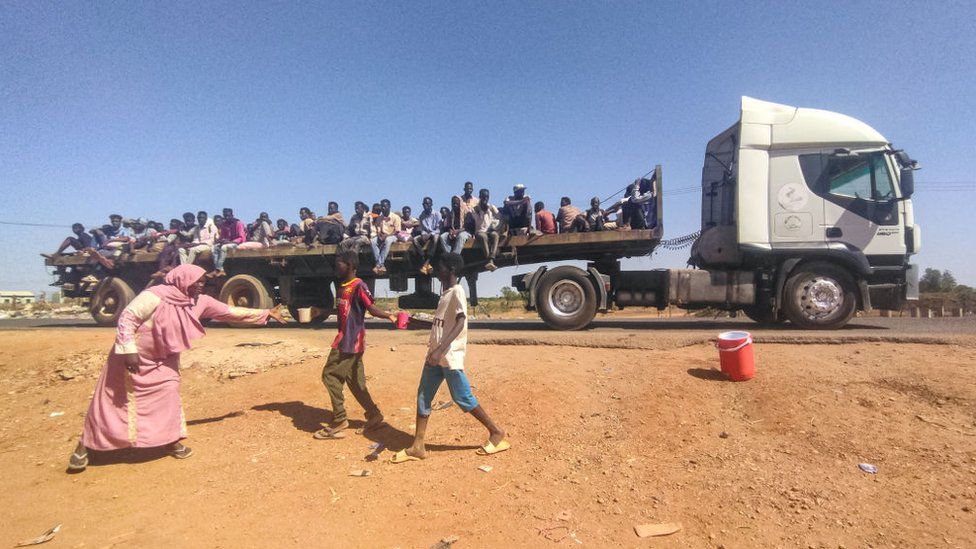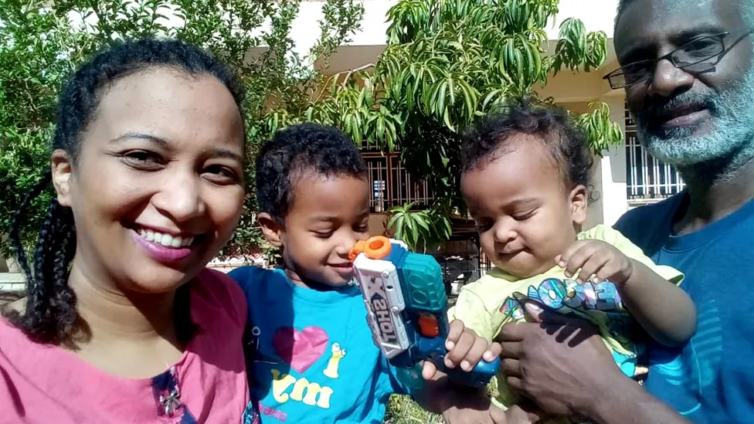Rasha Amin's five-year-old son now wets the bed at night after a neighbour's house in the capital, Khartoum, was struck by a missile in October.
"He wakes up at night crying because he had a nightmare or he's scared," explains the mother of two.
A golf ball-sized piece of shrapnel had smashed a hole through her wall and air conditioning unit and narrowly missed Rasha's other child, her 20-month-old toddler, who was asleep in his crib.
A paramilitary unit that had set up next door was the intended target and Rasha's explanation to her older child that people were filming an action movie did not convince him for long.
The 31-year-old schoolteacher and her family had a narrow escape in the eight-month civil war that has killed at least 10,000 people.
Nearly seven million others have fled from their homes but many, like Rasha and her family, remain trapped and traumatised amid the fighting.
Her house is still badly damaged.
She shows the BBC around virtually with her smartphone, pointing to cracks in the wall and windows and doors that are missing.
"We're still scared. We have to put our mattresses on the floor away from the windows," she says of her efforts to keep her family safe. "We also stay close to closets and the fridge in case the roof comes down."
Fighting between Sudan's army and its former ally, the powerful paramilitary Rapid Support Forces (RSF), broke out in April after a row between the generals leading the two groups.
Since then the army has struggled to control large parts of the country, losing much of the capital and the western Darfur region as the fighting escalates. It is now on the backfoot in central Sudan after the RSF recently took over the city of Wad Madani, the capital of Gezira state, which had been seen as a safe-haven from the fighting.
People who had sought safety from Khartoum are now having to run for a second time. Already at least 250,000 people have fled from Gezira, according to the UN.

AFP
The region is considered to be a bread basket for Sudan, producing 70% of its wheat, raising fears that the crisis could lead to serious food shortages and a "hunger catastrophe", in the words of a World Food Programme (WFP) spokesperson.
Rasha and her family did try to flee when the war broke out but were unsuccessful. Both her husband and children are British citizens, and she hoped the whole family would be eligible for evacuation.
The family paid "a lot of money" to be driven miles to a military base where Western evacuees were to be picked up. On the way they witnessed the horrors of war - dead bodies lying by the road, factories burning, people looting abandoned shops.
But their hopes of getting out were dashed when they arrived. Officials told her that her London-born husband and their children could be evacuated, but not Rasha.
"We were trying to say you can't separate a breastfeeding baby from his mother and we could pay for visa on arrival," she says, sobbing.
The family had no choice but to return home, says her husband Mohammed Said who believes it was "the sensible thing to do".
Since then he has pleaded for help from the British government to ensure his and other mixed-nationality families can be moved to safety in the UK.
Asked about the predicament of families like Rasha's, UK Minister for Africa Andrew Mitchell told the BBC: "We did relax some rules in some cases to try and help families that were caught in that position", and advised that the family "keeps in touch with the British Foreign Office".
Rasha and her husband have written emails to the Foreign Office and an MP they opted not to name, but say all they received were automated responses.
"Of course we feel abandoned," says Mohammed, while acknowledging the difficulty of reaching anyone trapped in the warzone.
In the meantime the family remains stuck in Khartoum, surrounded by armed men roaming the streets and faced with daily power cuts and a lack of basic services.
Efforts to try and broker a political solution to the conflict led by Sudan's neighbours - represented by the regional bloc the Intergovernmental Authority on Development (Igad) - and Saudi Arabia have so far been unsuccessful.
The warring generals - army chief Abdel Fattah al-Burhan and Mohammed Hamdan Dagalo of the RSF - have yet to agree to meet face-to-face. The prospect of getting them to the negotiating table became even more distant in recent weeks after Gen Burhan disputed an Igad announcement of a breakthrough and vowed to fight "to victory or martyrdom".
The US and British governments have said both sides have committed war crimes. The RSF has further been accused of conducting ethnic cleansing in the western region of Darfur.
In recent months, non-Arab communities in Sudan, particularly the Masalit, have been targeted, their villages burned and there have been reports of widespread rape.
"We will do everything we can along with our allies and like-minded people to bring those who perpetrate any form of human rights abuse and breaches of international humanitarian laws to account," Mr Mitchell, the UK minister, told the BBC.
Sudan's food situation was already dire before the war but the situation is getting worse as charities struggle to distribute aid.
"We've only been able to reach Khartoum with food assistance once in the last three-four months," said Leni Kinzli, the WFP spokesperson for Sudan.
The country's ability to feed its population will be seriously tested "Nobody feels safe anywhere in the country any more because the situation is devolving so rapidly... Come May, we are looking at a hunger catastrophe," Ms Kinzli told the BBC.
In Khartoum, Rahsa and her family are relying on support from relatives.
She sends her brother out to buy whatever he can get. If he is lucky, he can buy two spoons of powdered milk and two or three nappies at a time.
"There are no options for meat or chicken," says Rasha, adding that they now live on beans and vegetables. The children "have lost a lot of weight" she says, "and now their pants are falling".

Latest Stories
-
Man told he can’t recover £598m of Bitcoin from tip
5 minutes -
Gun-wearing leader sparks concern at Mahama’s inauguration
16 minutes -
Boeing and Google give $1m each to Trump’s inauguration
29 minutes -
TikTok to make final plea at Supreme Court against US ban
33 minutes -
Supreme Court rejects Trump bid to halt hush-money case sentencing
45 minutes -
Man with crocodile skull in luggage arrested at Delhi airport
1 hour -
Mozambique tense as opposition leader returns from exile
1 hour -
Ivory Coast president signals he would like to run for fourth term
5 hours -
Case of second preacher arrested over damaged vehicles at Parliament adjourned
5 hours -
Washing bay attendant fined for impersonating military officer, possessing gear
5 hours -
Loading boy arraigned over alleged theft of driving mirror
5 hours -
Disregard Young Apostles’ statement dissociating themselves from me – Anim Addo
6 hours -
Businessman in court for allegedly defrauding 18 rent seekers of GH¢100K
6 hours -
Islamic Foundation for Humanitarian Services completes 50-bed maternity block at Ejura Government Hospital
7 hours -
Nominate a competent Agric Minister – PFAG tells President Mahama
7 hours

